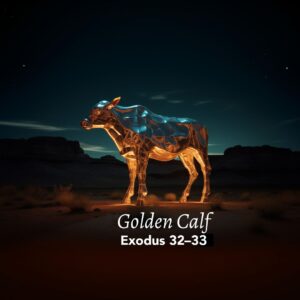Exodus 32-33: Golden Calf
February 12, 2024
TODAY'S BIBLE READING:
Exodus 32-33; Psalm 35; Matthew 15:1-20; Acts 21:1-26

Disaster! Aaron presumes to solve the problem of the people’s impatience at Moses’ apparent delay by giving them gods to worship (32:1-3). He makes a golden calf, and when they see it, they say that these are “your gods” who brought them up out of Egypt (32:4). They have become “relativistic pluralists,” worshipping multiple gods (32:6) and somehow or other thinking they can include “the LORD” among those gods, saying “tomorrow shall be a feast to the LORD” (32:5). Such ideological/theological chaos leads to social chaos, as is always the case. They “break out of their bounds,” and lose all discipline, shape, and cohesion as a people.
The LORD is angry (32:7-10). They have broken fealty with him, and he is ready to rain judgment upon them. Moses, however, intercedes, and God relents from his wrath (32:11-14). God’s anger is not like ours—intemperate, rash, without due cause or basis. It is a holy anger. His anger is set in opposition to that which is evil. But it is still anger, and it is a fearful thing to fall into the hands of the living God (Heb. 10:31).
God utters fearsome words when he describes his people as “Moses’ people” (32:7), and Moses intercedes for the people of God by reminding God in prayer that they are really “God’s people” (32:11), the people that God has brought together, and that he is the God of Abraham, Isaac, and Israel (Jacob) (32:13). Such prayer is not drawing out of God something that he does not want, but is interceding on the basis of God’s promises for a further end that is his ultimate will. God delights for his children to pray, and in his sovereignty has set up the system in such a way that his will is accomplished through our intercession, a provision that encourages us to have the kind of intimate relationship with God for which Moses was known.
When Moses comes down from the mountain, and hears the sound which is not the sound of war but the sound of singing (how in tune were they?!), he also is incensed (32:15-20). He asks Aaron to give account for what he has done (32:21). Aaron has utterly failed in his delegated responsibilities, and claims that somehow the golden calf fell out of the fire spontaneously (32:22-24). Moses calls to him all those who are on the LORD’s side, and the Levites come to him, and they are commanded to exact fearsome discipline on the rest of God’s people (32:25-29). Sin has its consequences, and while we do not live in an Old Testament theocracy, we are to be warned that our sin has consequences unless it is covered by the blood of Jesus and favor from God is sought through repentance and prayer.
Moses now intercedes for God’s people (32:30-32). While his prayer was successful, his intercession is ultimately not (32:33-33:6). God will punish sinners for he is a holy God, and he will blot out of the book of life all those who sin against him. Moses is a type of the intercessor we need, but he is not the sufficient intercessor. Only Christ can pray for God’s people and be effective in his atonement—“Father, forgive them for they know not what they do” (Luke 23:34).
Moses has a special relationship with God, meeting him in the “tent of meeting,” a meeting place that his mentee Joshua loves to be present at as well (33:7-11). Moses longs that God’s presence would go with God’s people (33:12-17)—what else would make them distinct from any other people—and the glory of God is to pass in front of Moses, proclaiming the essence of that glory as the grace and mercy of the sovereign will of the LORD (33:18-23). The glory of God is wrapped up in the gospel of grace and mercy, a glory that is finally revealed in the One whom John says that we have seen his glory, “glory as of the only Son from the Father, full of grace and truth” (John 1:14).
ABOUT THE AUTHOR
Josh Moody (Ph.D., University of Cambridge) is the senior pastor of College Church in Wheaton, IL., president and founder of God Centered Life Ministries, and author of several books including How the Bible Can Change Your Life and John 1-12 For You.
WANT MORE?
To receive God Centered Life devotionals directly in your inbox, as well as other resources, enter your email address in the form at the bottom of this page and click "subscribe."

